Previously on Drokk!: We are firmly in the Garth Ennis era of Judge Dredd by this point, which has so far included a climax to the growing democracy story arc that concluded, stunningly, that fascism is apparently really cool because Judge Dredd is tough. If you think that’s the nadir of the strip, just wait.
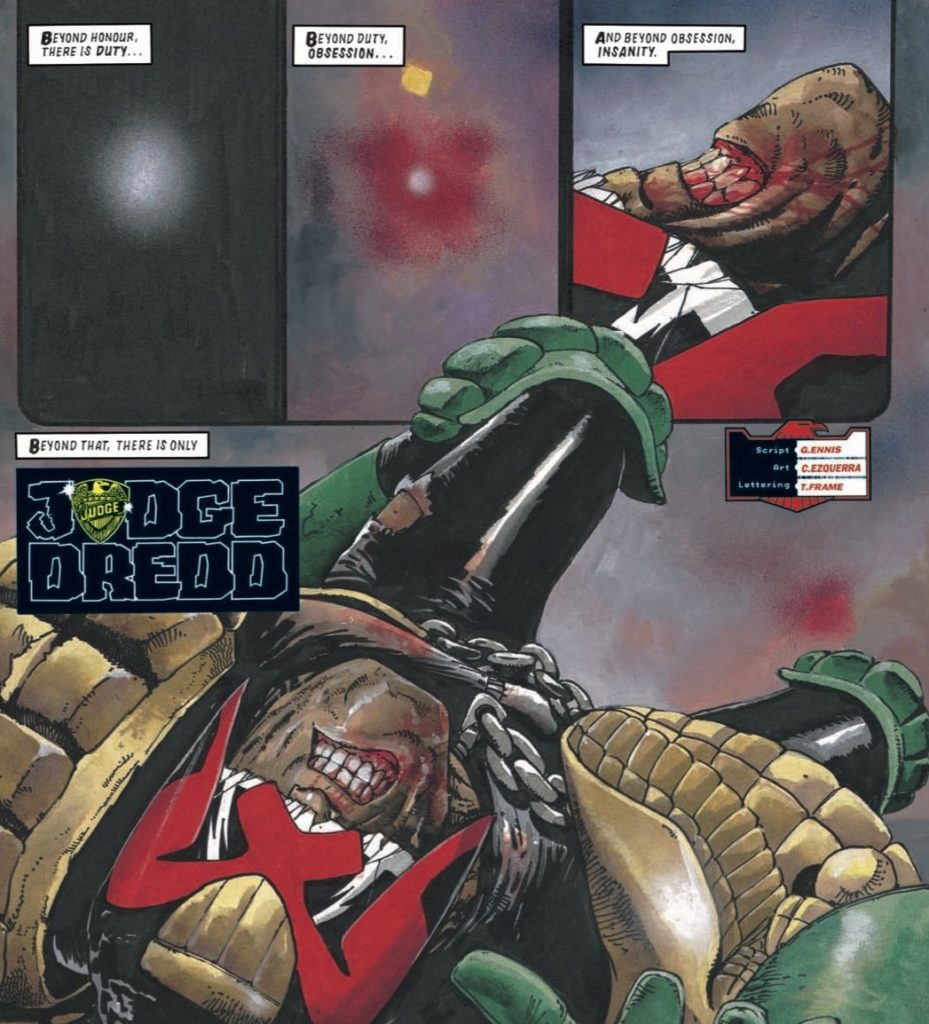
0:00:00-0:03:08: Another swift introduction for this episode, as Jeff and I let everyone know who we are and that we’re reading Judge Dredd: The Complete Case Files Vol. 17 and Batman/Judge Dredd: Judgement on Gotham this episode, with the latter perhaps the sole thing from preventing both of us from being overwhelmed by the Young Garth Ennis of it all.
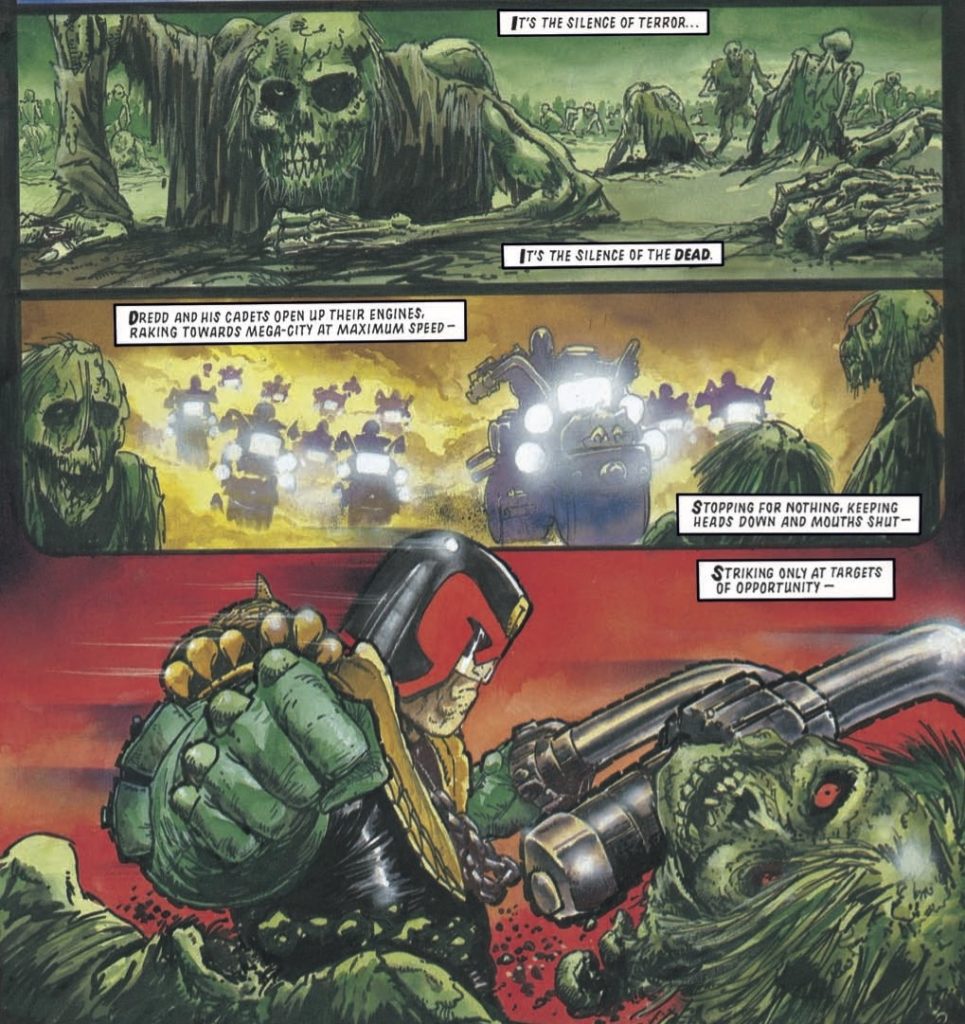
0:03:09-0:26:16: I misdirect us a little bit at the start by pointing out that, at the same time Ennis was writing these (very bad) Dredd stories, he was also writing Hellblazer for DC, which was… far better than this…? This leads us to a somewhat more-fragmented-than-usual discussion about the importance of artists on making Dredd work — especially Carlos Ezquerra, in this volume — and what Jeff calls the “zen koan” of what makes an effective Dredd story in terms of writing. We also touch on Judgement on Gotham earlier than intended, Simon Bisley and Chris Halls, and debts owed to Bill Sienkiewicz.
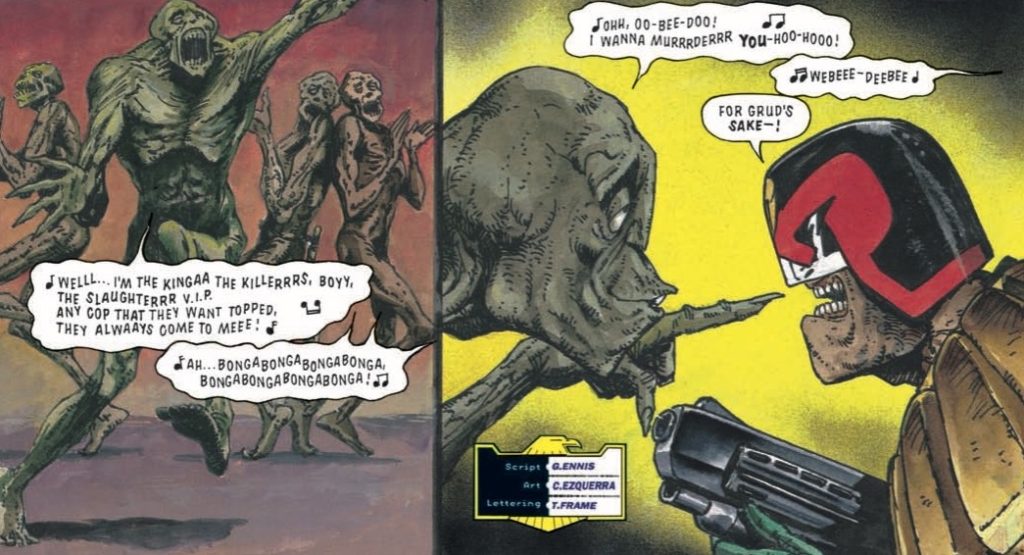
0:26:17-1:06:59: We dive into “Judgement Day,” the massive mega-epic that takes up fully half of Case Files 17 and fails so utterly on so many levels. On the one hand, it’s a big deal — not just the first crossover between 2000 AD and Judge Dredd Magazine, it’s also a crossover between Judge Dredd and Strontium Dog, with the latter guesting in basically the entire story. Unfortunately, as we cover at length, “Judgement Day” is a mess — a zombie story that doesn’t really understand zombie stories or know what to do with them, that passes up every available opportunity to say something interesting about its characters, that doesn’t necessarily comprehend how to pace a story, and one that doesn’t seem to understand that telling the reader that a bunch of people are in trouble isn’t the same as actually demonstrating it. Jeff suggests that Garth Ennis is getting worse when it comes to Dredd, but I’m not necessarily convinced, and we approach the idea that this is Ennis at a stage in his career where he’s not yet realized that other people aren’t quite as fascinated by the myth of the tough guy that can withstand everything thrown at him as he, himself, is. Suffice to say, we’re all in on just what a bad choice for Dredd Ennis is, at least in this particular phase of his career.
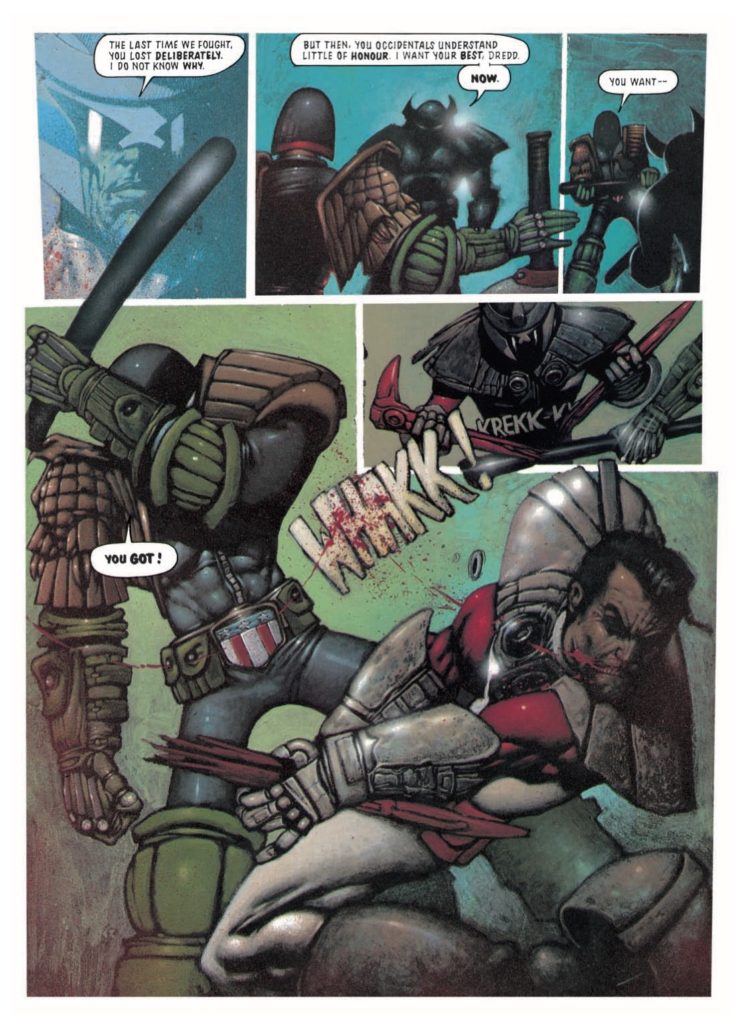
1:07:00-1:15:57: Spinning out of the above, Jeff suggests that the comics in Case Files 17 might be both creatively and morally bankrupt — at least in the eyes of a fictional Gary Groth — which brings us to a discussion of whether or not this is the fault of creators who clearly weren’t ready for the gig just yet. Was 2000 AD that creatively desperate, or was this the result of those involved feeling that Dredd needed a reinvention after more than a decade, and just making poor decisions when approaching that reinvention?
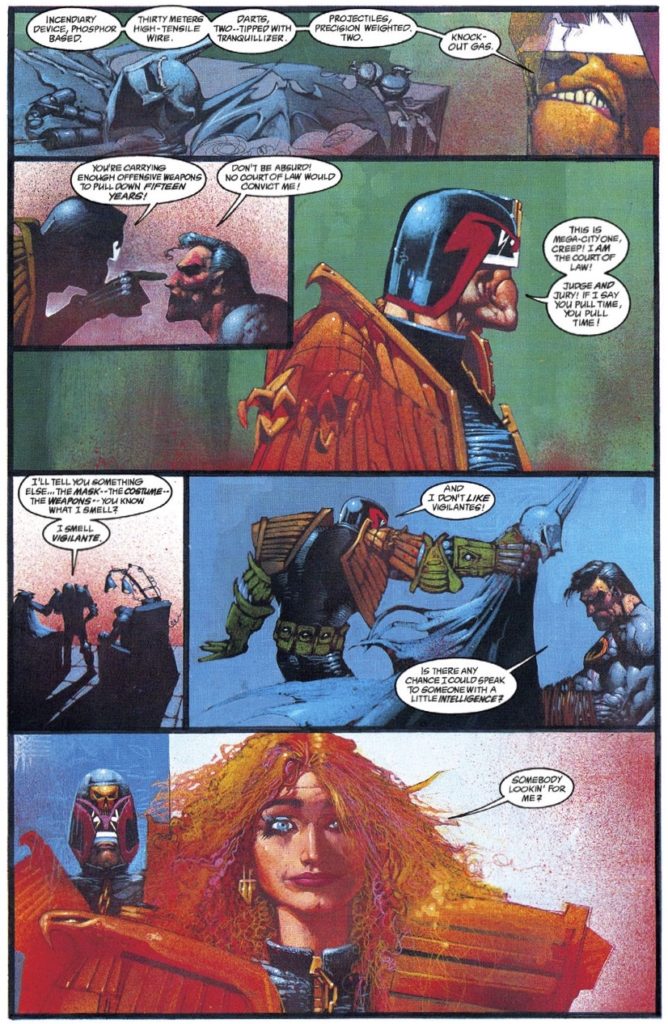
1:15:58-1:37:33: If the new guard creators is failing Dredd, then surely the old guard are doing better, especially in a high-profile project like Batman/Judge Dredd: Judgement on Gotham? The answer is… fine, more or less…? The first crossover with Batman is a fun read, but a throwaway one that relies more heavily on Simon Bisley’s artwork than the writing to make it work. Jeff has an explanation as to why that may be, even as both of us are disappointed by how some of the characters are written. This brings us back to a comparison between John Wagner and Alan Grant, and Garth Ennis, and how disappointing the latter seems by comparison — and whether or not that’s his “fault,” or simply a sign that, perhaps, a 22-year old fan didn’t stand much of a chance when replacing creators who have been working for pretty much as long as he’s been alive.
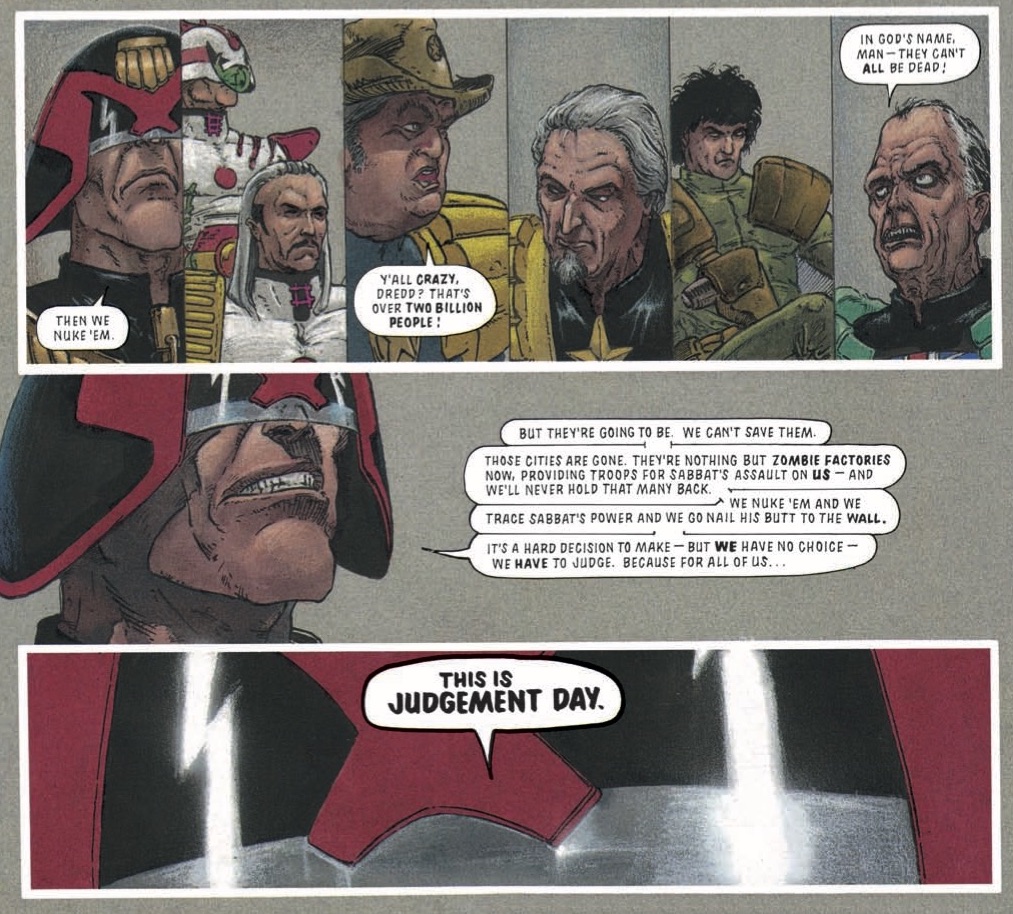
1:37:34-1:44:33: As we start to close things up, I talk about it having been a rough episode in terms of reading material, and admit that I cheered myself up by reading the current Dredd serial in 2000 AD, which prompts Jeff to detect a sign of optimism — that we know that both Dredd and 2000 AD have better days ahead after just how poor this particular material is.
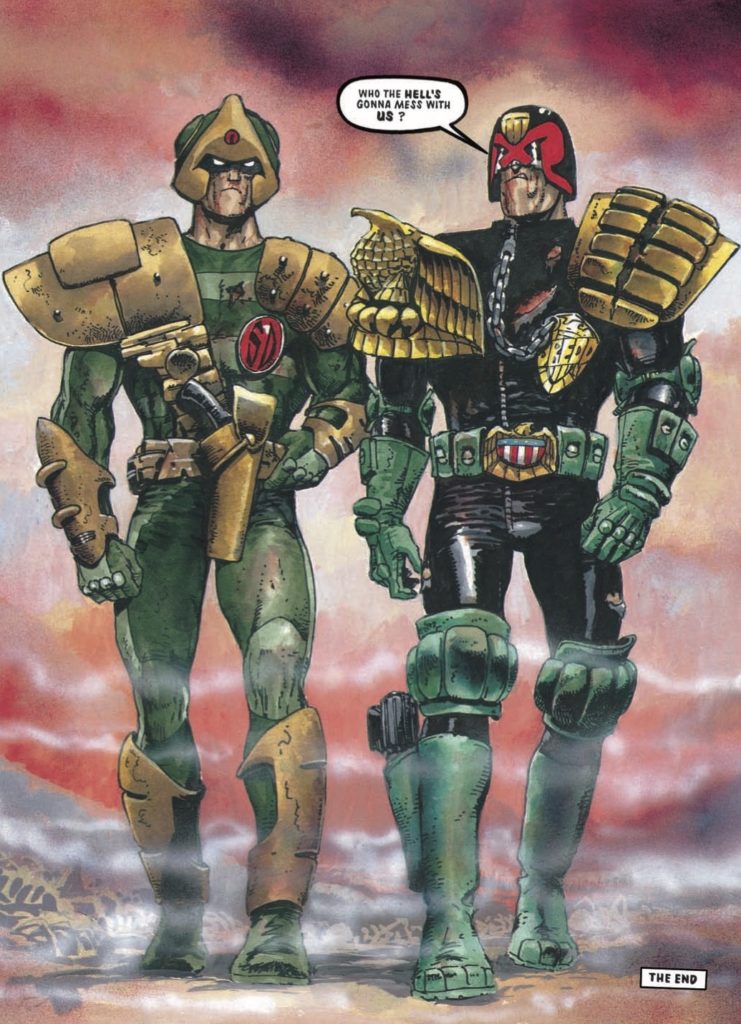
1:44:34-end We look ahead to the next episode, which sees John Wagner come back for more than three episodes at a time, Jeff asks about my love for the final panel in “Judgement Day” despite my intense dislike for the rest of the storyline, and we mention, as always, the Patreon, Twitter, Tumblr and I-swear-I’ll-use-it-again-soon Instagram. If you made it through all of this, we’re very grateful. It wasn’t easy.


No mention of the bizarre appearance of Dennis the Menace?
Reading Judgement Day for the first time reminded me a lot of seeing Prometheus. “You know what’s a good film? Alien. Alien’s a good film. I should go and watch Alien again.”
This was basically the same thing, but it goes, “This isn’t very good, but it *is* nice seeing Carlos Ezquerra draw Johnny Alpha again. I should go and read some classic Strontium Dog. I bet I’ll still like it after all these years.” And in the interim, I have indeed bought and read the first three volumes of the Search/Destroy Files. So if the goal of Judgment Day was to make people want to reread better stories with Johnny Alpha in them, mission accomplished, at least in my case.
But rereading all those classic Strontium Dog stories afterwards makes me much harder on on Judgement Day than I would otherwise be.
Strontium Dog, not Judge Dredd, was my favorite 2000 AD strip when I was growing up. As an adult, I can see that there are reasons why Dredd’s a more important character than Johnny Alpha.
Superficially, they’re not dissimilar – dour, taciturn, grim tough guys who are violent men in violent worlds. But Johnny Alpha (it’s curious how it feels wrong to call him either “Johnny” or “Alpha,” without the other part of his name) is a much more conventional hero than Dredd. I mean, he *is* a hero – you could never call Johnny Alpha an antihero in the same way that you can call Dredd that.
And he’s an instantly recognizable type of hero. If Jeff Lester wants to know if he would like Strontium Dog? If you like stories about that classic western/noir archetype of the man who lives in an unjust and violent world that gives him no choice other than to be good at doing violent things, but who maintains a core of decency by following his own personal moral code without compromise, and who underneath the hard exterior has a profound capacity for sensitivity, strong emotions, friendship, and love (the Wulf-Johnny relationship is probably the most romantic thing in classic 2000 AD) — if you like that sort of story done really well, Strontium Dog is for you.
(Also, it’s probably good if you like stories that feature large men with beards.)
And this makes Judgement Day a terrible missed opportunity. Well, maybe not terrible. 2000 AD didn’t do a lot of crossovers, and arguably it was better off for it, maintaining the integrity of each strip’s own fictional world.
But if you are going to have a crossover, Johnny Alpha as a character does offer some interesting possibilities of being used to interrogate Dredd as a character — precisely because he is so similar on the outside, but different when you take a closer look. I’m not saying that it would be a good idea to have “Judge Dredd and Johnny Alpha discuss their different views on the meaning of justice” for several issues, but Ennis could at least have *tried* to focus this story on the fact that they have different outlooks.
How does Dredd react when he learns that Johnny Alpha works as a law-enforcement agent (of a sort) because his society doesn’t give him a choice? We’ve seen that Dredd deep down does allow himself to love Mega-City One — what about the fact that Johnny Alpha is an exile who has no home? Even the really obvious point, that Johnny Alpha as a mutant is a member of a marginalized and despised class, just as mutants are in Mega-City One — it comes up, but Ennis doesn’t really *use* it.
Instead, what we learn is that Dredd would win in a fight. Well, I’m sure there was a playground debate in Holywood about that sometime in 1983, and it was very important to settle the question.
It’s bizarre. Because the one thing that everyone knows about zombies is that they are deeply boring in themselves — zombie stories are about the people that they are attacking. And you have this very obvious low-hanging character fruit to exploit, and Ennis leaves it on the tree.
Other scattered thoughts:-
-Judgement Day is the first Dredd mega-epic where it really feels as if the idea to have a mega-epic came first, and what the story would be came second.
-The odd thing is that all the stuff modeled after the Apocalypse War means that it’s zombies-as-war-story. And Ennis actually cares about war stories! You would never guess from reading this that war comics were going to be something for which he was to be known.
-You know the sexism of having every single best judge from all the different mega-cities be a man is rather blatant. It would be different if this had been published in 1979 in the early years of the script – The Day the Law Died is equally short on female judges.
-David Morris wins. I said that the satire in Emerald Isle didn’t exclude Protestants from Irishness, but here it’s explicit that the Irish judges are priest-ridden and dominated by the Catholic Church.
This is another point where it’s interesting how dated the satire seems in 2020. It would probably have seemed on point in 1992 (although things were in fact changing in the Republic, and this was already a little out of date – but it would have been fair enough when Ennis was growing up). But in 2020, it’s amusing to read a person from a Northern Irish Presbyterian background have a go at the South for the excessive influence of religion.
At any rate, though, this does mean that you can’t let Ennis off the hook (as Kelly Kanayama, his most important and interesting commentator, has done) by saying that he’s mocking as a member of the group being mocked. Not that it really should be that big a deal – Irishness is not really a particularly marginalized category. And history has its own comeback: it’s very hard to feel, in 2020, that this is punching down.
That being said, the portrayal of Joyce does make an interesting contrast with that of Judge Armour (Good Lord, that name), who, although pretty tangential, seems very much a classic admiring portrayal of a stiff-upper-lipped officer-class British military commander done absolutely straight.
-This aspect of Ennis’s Judge Dredd work makes for an interesting contrast with his contemporary Hellblazer work, beyond the gulf in quality on which they touched. (And I didn’t actually like Ennis’s Hellblazer all that much and missed Jamie Delano. But, yes, it was better.) Ennis’s Hellblazer is explicitly left-wing in its orientation, sometimes even hamhandedly and awkwardly so in a Pat Mills vein, in a way that one would never guess from his Judge Dredd stories.
Not much to add to Voord99’s comments beyond Judgement Day’s sexism being showcased by being the unironic story of two manly men surrounded by other manly men while the women characters are torn apart physically. By men (were there any women zombies?)
Secondly Jeff, if Voord99’s excellent pitch for Srontium Dog doesn’t sell you on the idea it’s also the only comic I know of to strongly imply that it’s titular character, his female equivalent and Ronald Reagan have sex together in a shower (I never tire of posting this link: https://twitter.com/2000ad/status/624521191613722624)
It is also almost exclusively drawn (beautifully) by Carlos Ezquera.
Speaking of art, and referencing your own criticisms of it, this has to be said to have been a flaw of 2000ad throughout its run (and vocalised by Brett Ewins) where there would be one very popular artist and new artists would be encouraged to draw like them. In the black and white days it was Brian Bolland (it was the continual requests for Ewins to make his art appear more like Bollands that led to his departure from the Judge Andersoin strip, iirc) and, post Slaine: The Horned Beast, it was Simon Bisley. The biggest difference was the the pre colour 2000ad days had a string of veteran artists who predated Bolland or who developed their own strong styles, whereas just as with Ennis coming from a fan background led to the detriment of his Dredd stories, and argument could be made for the new (and very young) artists having the same problem, especially as producing colour was more time consuming than black and white.
That said, I have no end of sympathy for the artists of Judgement Day who probably had heart attacks when they received scripts featuring panel descriptions along the lines of “and this panel features two billion zombies on fire. And the deadline is in three days”
As someone who got the humble bundle and plowed through the case files does the double page spreads being sliced awkwardly continue to be a thing cause it’s made pages really difficult to read physically. Second question for more experienced 2000ad readers would the trades be a better second part of the path than the bundles of progs/megazines?
First, all this time I thought Strontium Dog was a about, you know, a dog. It’s a person!? I mean, 2000 A.D. has strips about bears and sharks and dinosaurs and hats (Rogue Trooper), so I had just assumed all this time it was about a dog. Possibly made out of strontium. Color me shocked!
It’s funny, after the first Ennis Case Files, I too read vs. Batman, and then after the last volume I read vs. Predator/Aliens. There’s a lot of plot similarities between the Dredd vs. Aliens and this Judgement Day story, which had me weirdly expectant for Judgement Day, because, hey, zombies can be fun. Dredd has faced supernatural foes before–let’s do this. Really, the only thing that ended up keeping me going was the hope that it might even approach the Aliens story in quality–somewhere. But it was bad for all the reasons discussed in this episode.
I hated that all the world’s judges are such stereotypical caricatures. Dredd has always been a good distillation of an American archetype, but these other judges–yikes! At least the Hondo judges came off less stereotypical this time around, so progress? Speaking of all the judges, just how many countries survived the original nuclear war? Am I to believe that the only casualties of the nuclear war preceding Dredd are the Idaho, Ohio, Oklahoma, and the world’s oceans? It seems like almost all of the countries survived, especially since mega cities are country sized, which I feel detracts from the idea of Mega-City 1 as one of the few bastions of humanity to remain. I guess we’re going to find out at some point MC2 survived the nuking here.
Thanks to our hosts for the meta commentary on 2000 A.D. From Ennis’ first strip I couldn’t help but wonder how the premiere British comics magazine would stoop to using such an untested writer. This thought process continued with the “paucity of talent” (as Graeme said) in the artists lineup.
Only thing I ‘ll add about Dredd vs. Batman is that I get it much more now than I did in the ’90s when I had no context for Dredd. Yes, it’s a Brave and the Bold story (which I also had no context for), but it’s a story that fits much more in Dredd’s universe/milieu than in Batman’s. Still love some Bisley art, though.
Johnny Alpha is a dog. That’s his mutation. He’s a mutant dog who is intelligent and looks human. “Alpha” is for “alpha dog,” in fact — the idea is that he’s the top dog. This is why his early stories all featured him with his human partner Wulf Sternhammer, in what was intended as a “Man’s best friend” riff. There’s a subtle allusion to this in Judgement Day, when the dying Judge Bruce says that Johnny Alpha isn’t bad for a “Pom.” It’s easy to suppose that this is more annoying ethnic stereotyping, this time of Australians. But in fact, what Bruce is referring to is the fact that Johnny Alpha is a Pomeranian.
None of the above is true.
I’ll admit, you had me going for a few sentences there. Sure, he’s a mutant dog who looks like a human. Why not?
Hahahhahahahha!
Thanks for the heads up on the humble bundle. Not having read a lot of Dredd, I’m hoping vols 1-5 plus a re-listen to some Drokks will have me on my way!
I was a bit pre-emptive with my comment on when I stopped following Judge Dredd. It turns out I carried on until the end of Necropolis and the final fate of Kraken. Well done younger self, decent decisions were made! Emerald Isle was enough to stop again. The pair of you talking about disappointing comics is still entertaining and I appreciate the service you provide in sifting the Drokk from the Dross. There is so much Dredd that rather than ‘jumping on points’, I’m interested in ‘popping-in points’. I re-read Castle Waiting and a goodly chunk of Final Crisis last weekend and am happy with my choices.
From the distance of not having read or intending to read the comics in question I wonder who Ennis’s editor was on Hellblazer and if they had the skills and personality to require more from him than the 2000ad editor of the time?
It’s funny – all valid criticisms, but Judgement Day in particular and then Zenith Phase IV are the comics that got me regularly reading 2000AD and the Megazine. I can only really look at these through almost 30 years of nostalgia. Carlos’s art was the absolute stand out at the time.